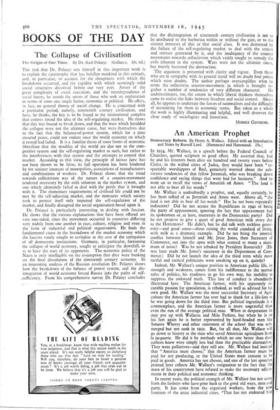BOOKS OF THE DAY
The Collapse of Civilisation
The Origin of Our Time. By Dr. Karl Polanyi. (Gollancz. 10s. 6d.)
THE task that Dr. Polanyi sets himself in this important work is to explain the catastrophe that has befallen mankind in this century, and, in particular, to account for the abruptness with which the breakdown occurred, and the rapidity with which seemingly solid social structures dissolved before our very eyes. Aware of the great complexity of social causation, and the interdependence of social forces, he avoids the errors of those who seek an explanation in terms of some one single factor, economic or political. He offers, in fact, no general theory of social change. He is concerned with a particular period, namely, nineteenth century civilisation, and here, he thinks, the key is to be found in the institutional complex that centres round the idea of the self-regulating market. He shows that this was bound to break down, and that the wars which heralded the collapse were not the ultimate cause, but were themselves due to the fact that the balance-of-power system, which for a time ensured peace, could not endure once the world economy on which it rested had failed. It is a familiar thesis of some forms of economic liberalism that the troubles of the world are due not to the com- petitive system and the self-regulating market as such, but rather to the interferences with that system and the attempts to control that market. According to this view, the principle of laissez faire has not been shown to be false; its full operation has been hindered by the sinister interests of monopolists, associations of manufacturers and combinations of workers. Dr. Polanyi shows that the trend towards collectivism was of the nature of a counter-movement rendered necessary by the evils inherent in the market system, and one which ultimately failed to deal with the perils that it brought with it. The elementary requirements of civilised life could not be
• met by the self-adjusting market, and the measures which society took to protect itself only impaired the self-regulation of the market, and finally disrupted the social organisation based upon it.
Dr. Polanyi is particularly interesting in dealing with fascism. He shows that the various explanations that have been offered are very one-sided, since the movement occurred in countries differing very widely from one another in race, culture, religion and even in the form of industrial and political organisation. He finds the fundamental cause in the breakdown of the market economy which the fascists vainly sought to revitalise at the cost of the extirpation of all democratic institutions. Germany, in particular, foreseeing the collapse of world economy, sought to anticipate the downfall, so 35 to have the start of its opponents. The economic policy of the Nazis is only intelligible on the assumption that they were banking on the final dissolution of the nineteenth century economy. In an interesting analysis of the Russian revolution Dr. Polanyi shows how the breakdown of the balance of power system, and the dis- integration of world economy forced Russia into the paths of self- sufficiency. From his comprehensive survey Dr. Polanyi concludes
that the disintegration of nineteenth century civilisation is not to be attributed to the barbarian within or without the gate, or to the sinister interests of this or that social class. It was destroyed by the failure of the self-regulating market to deal with the strains and stresses generated by it, and the inadequacy of the counter movements towards collectivism which vainly sought to remedy the evils inherent in the system. Wars were not the ultimate cause, but merely hastened the destruction.
The argument is presented with clarity and vigour. Even those who are in sympathy with its general trend will no doubt find points which raise doubts. The author perhaps oversimplifies what he terms the collectivist counter-movement in which is brought to-
gether a number of tendencies of very different character. He underestimates, too, the extent to which liberal thinkers themselves came to realise the links between freedom and social control. Above all, he appears to underrate the forces of nationalism and the difficulty of accounting for them in economic terms. But taken as a whole the work is highly illuminating and helpful, and well deserves the close study of sociologists and historians.
MORRIS GINSBERG.






























 Previous page
Previous page